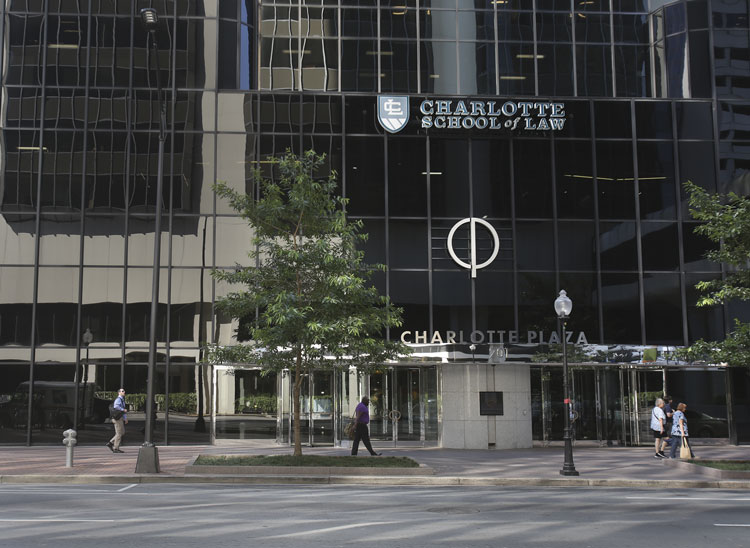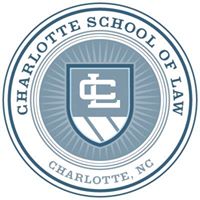Private equity fund that owns Charlotte School of Law sued in Illinois state court for alleged fraud

The now-shuttered Charlotte School of Law. Photo by Albert Dickson. (ABA Journal file photo).
Former students at Charlotte School of Law recently filed two Illinois state court actions alleging consumer fraud and deceptive business practices against Sterling Capital Partners, a Chicago private equity firm that owns the law school.
On March 22, a group of former students filed a lawsuit in Cook County Circuit Court against Sterling Capital Partners and other related affiliates (known collectively as Sterling Entities), demanding tuition reimbursement, Law360 reports. The latest lawsuit joins a similar one filed in February against Sterling Entities.
In 2017, Sterling Capital won its motion to be dismissed as a defendant in another fraud lawsuit brought against Charlotte School of Law, filed in the North Carolina U.S. District Court, on the basis that the court did not have jurisdiction against Sterling Entities. Sterling Capital’s three law schools are run by two entities collectively known as InfiLaw. Sterling Capital did not respond to an ABA Journal interview request.
Charlotte School of Law was started in 2006 and received full ABA accreditation in 2011, according to the complaints. For 2012 through 2014, total student enrollment was approximately 1,400.
“From the time the Sterling Entities established the InfiLaw and CSL subsidiaries, the Sterling Entities and their subsidiaries recklessly planned to increase CSL’s enrollment, revenue and profit once it obtained full ABA accreditation by slashing standards for admission and curricular quality,” both complaints state.
Plaintiffs who attended Charlotte School of Law have $170,000 in student debt on average, according to the complaints. They allege that InfiLaw’s creation coincided with the expansion of the federal Direct Plus loan program, which lifted caps on how much graduate students could borrow and did not set limits on what tuition schools could charge. In 2016, full-time tuition at Charlotte School of Law was $44,284, according to its 509 Report for 2016.
The Illinois actions have a total of 25 plaintiffs, who each seek judgments in excess of $50,000, in addition to costs and attorney fees. Charlotte School of Law closed in August 2017 after the council of the ABA’s Section of Legal Education and Admissions to the Bar rejected its proposed teach-out plan.

Christopher Bagley, a North Carolina lawyer who represents the Illinois plaintiffs, tells the ABA Journal that he and other plaintiffs counsels also represent former students at Arizona Summit School of Law, an InfiLaw school that is operating under a teach-out plan. One InfiLaw school, Florida Coastal School of Law, remains open.
The complaints also allege that Charlotte School of Law misled students about its compliance with ABA standards before it was placed on probation in 2016, and again misled current and prospective students when the U.S. Department of Education denied the law school’s application to participate in the federal student loan program, in 2016 and 2017.
The lawsuits also allege that Sterling Capital maintained control of Charlotte School of Law, as well as other law schools run by InfiLaw, by placing Sterling Capital management in law school president positions, with the dean being second-in-command. ABA accreditation standards require that faculty have meaningful input with deans’ selection, according to the complaint, but there’s no similar requirement for a stand-alone law school’s president.
Also, Sterling staffed Charlotte School of Law’s admissions office with employees of their other subsidiaries, who were instructed to increase enrollment without regard to student outcomes, according to the complaints. It’s also alleged that Sterling advertised to applicants that a C-curve was only for first-year students and then changed the requirement to apply to second- and third-year students as well.
“CSL’s lax admission standards and tight grading curve were essential to its business model: enroll the maximum number of students, regardless of whether they are adequately prepared for law school, and collect millions of dollars in tuition and fees, but then, in order to inflate CSL’s bar passage rate, discard the students who were deemed unlikely to pass the bar exam,” the complaints state.
Also mentioned in the complaints is the law school’s Alternate Admission Model Program for Legal Education, known as AAMPLE. Plaintiffs allege that the six-week program targeted applicants with low undergraduate GPAs and LSAT scores below 140 and offered six-week classes similar to law school courses, but easier. Instructors who taught AAMPLE were surprised when program participants they had flunked later turned up in first-year JD classes, according to the complaint.
See also:
ABAJournal.com: “Some ex-students join Charlotte School of Law in limited settlement fund motion”
ABAJournal.com: “Charlotte School of Law sues ABA, arguing it was never out of compliance with bar pass rule”
ABAJournal.com: “ABA should never have accredited now-closed Charlotte School of Law, lawsuit claims”
ABA Journal: “Charlotte School of Law not alone in facing an uncertain future”



